Philips Electronics' Expansion into Portugal: Business Analysis Report
VerifiedAdded on 2020/11/12
|13
|3482
|327
Report
AI Summary
This report provides a comprehensive analysis of Philips Electronics' potential expansion into Portugal. It begins with background information on the company and the business environment, including PESTLE analysis and Porter's Five Forces. The report then examines the economic, political, social, technological, environmental, and legal factors influencing Philips' operations in Portugal. It analyzes business opportunities using Ansoff's matrix, focusing on market penetration, market development, product development, and diversification strategies. The study highlights the advantages of Portugal for foreign direct investment and concludes with recommendations for Philips to leverage market opportunities and expand its business effectively. This report is a valuable resource for understanding the strategic considerations for Philips in the Portuguese market, offering insights into market dynamics, competitive forces, and growth potential.
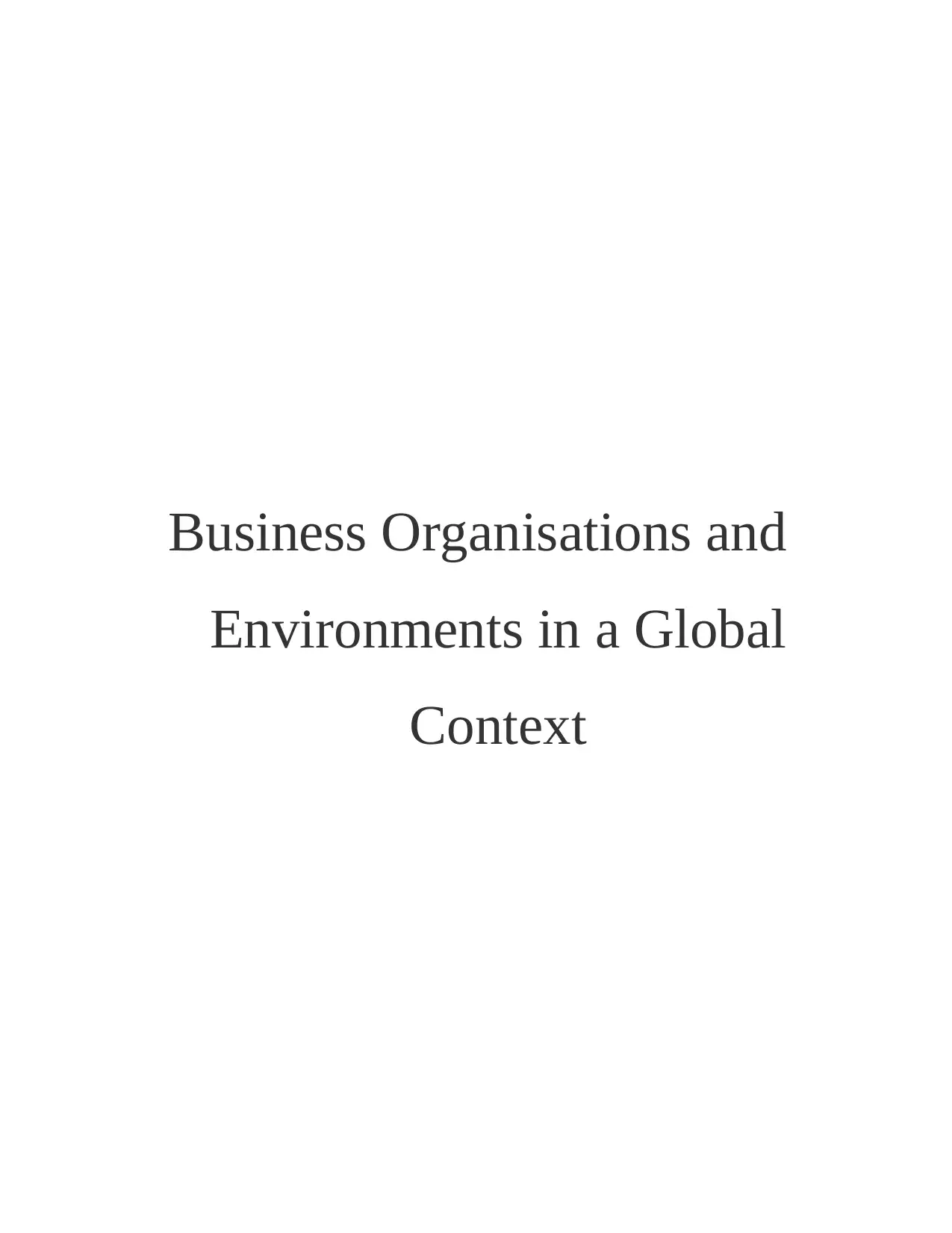
Business Organisations and
Environments in a Global
Context
Environments in a Global
Context
Paraphrase This Document
Need a fresh take? Get an instant paraphrase of this document with our AI Paraphraser
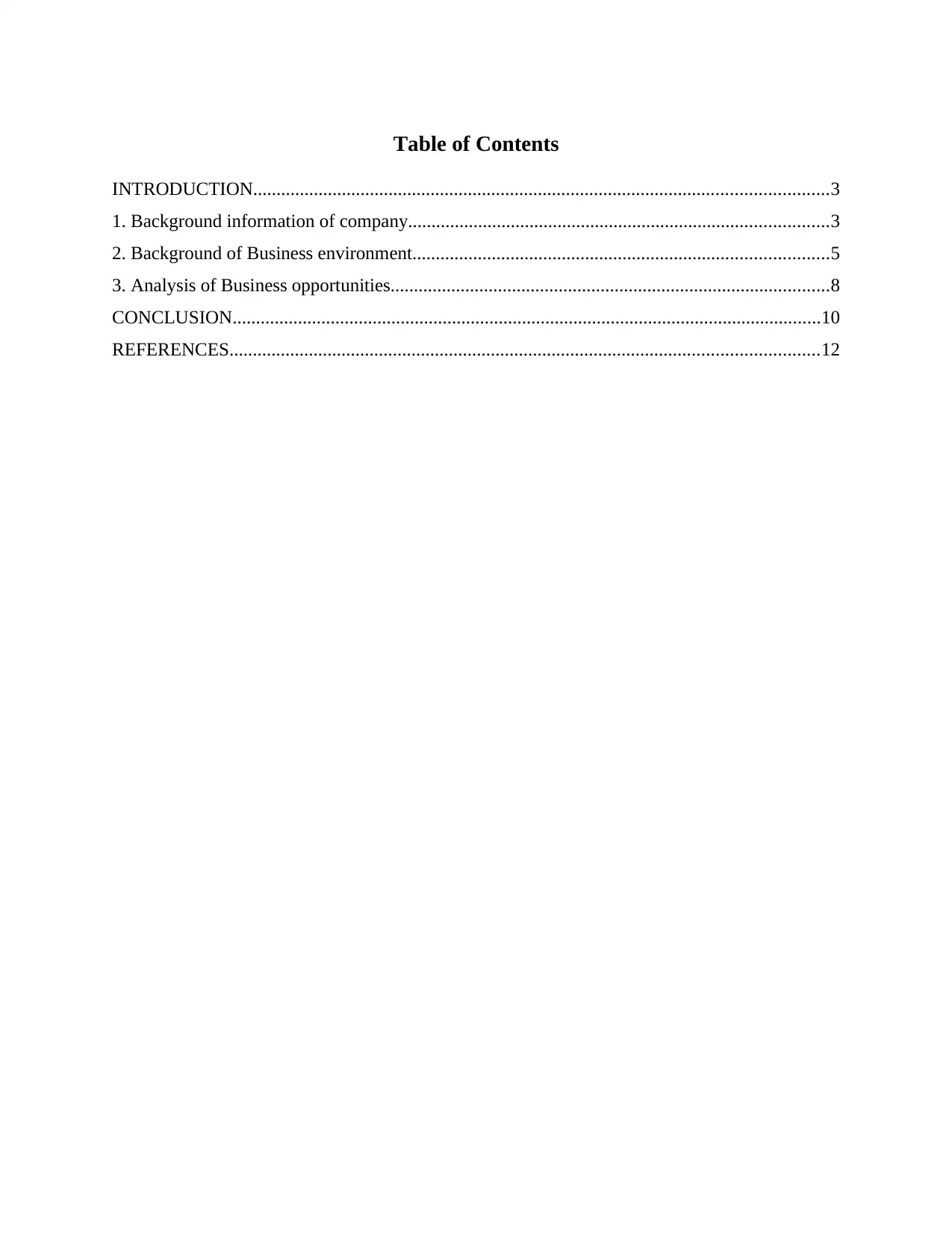
Table of Contents
INTRODUCTION...........................................................................................................................3
1. Background information of company..........................................................................................3
2. Background of Business environment.........................................................................................5
3. Analysis of Business opportunities..............................................................................................8
CONCLUSION..............................................................................................................................10
REFERENCES..............................................................................................................................12
INTRODUCTION...........................................................................................................................3
1. Background information of company..........................................................................................3
2. Background of Business environment.........................................................................................5
3. Analysis of Business opportunities..............................................................................................8
CONCLUSION..............................................................................................................................10
REFERENCES..............................................................................................................................12
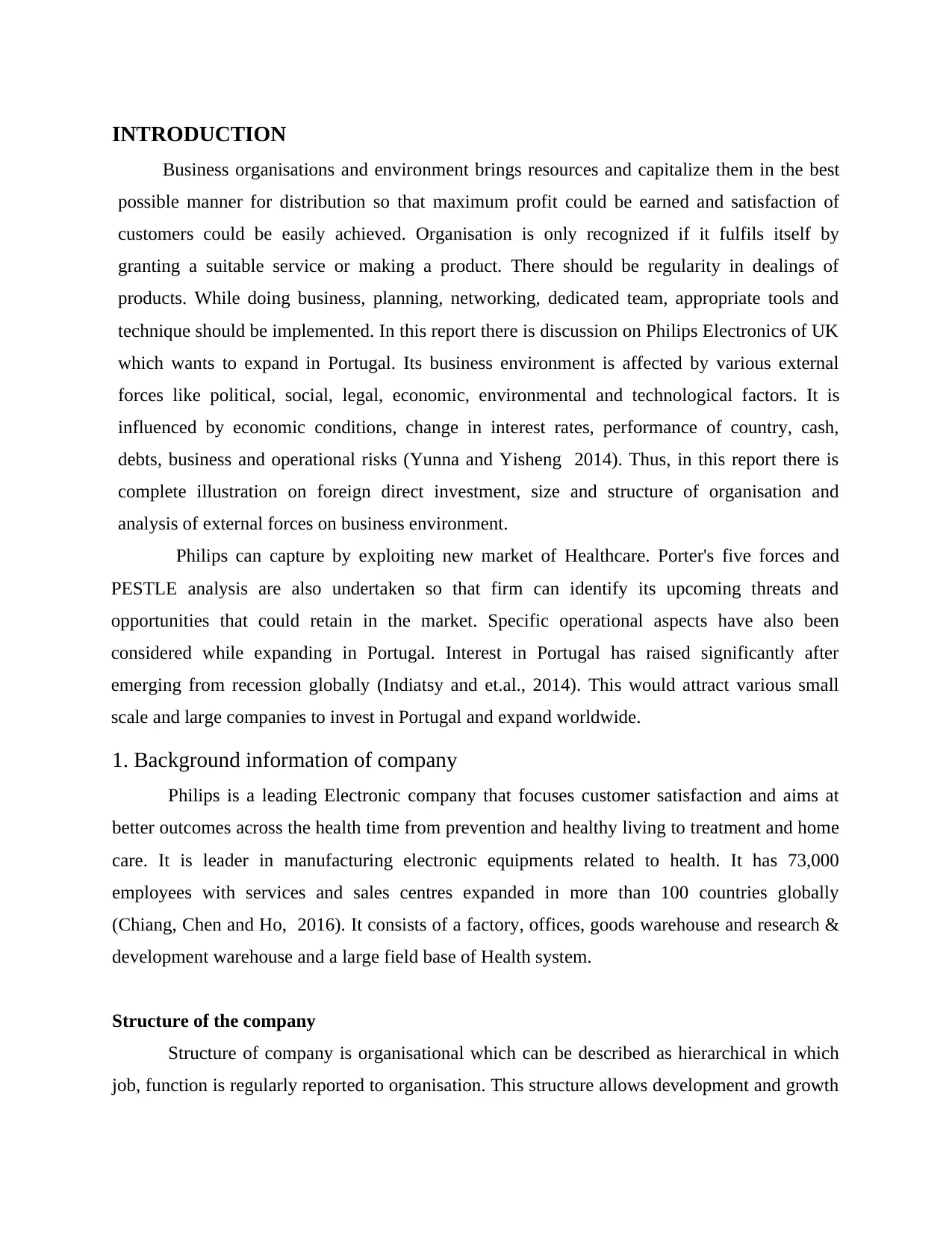
INTRODUCTION
Business organisations and environment brings resources and capitalize them in the best
possible manner for distribution so that maximum profit could be earned and satisfaction of
customers could be easily achieved. Organisation is only recognized if it fulfils itself by
granting a suitable service or making a product. There should be regularity in dealings of
products. While doing business, planning, networking, dedicated team, appropriate tools and
technique should be implemented. In this report there is discussion on Philips Electronics of UK
which wants to expand in Portugal. Its business environment is affected by various external
forces like political, social, legal, economic, environmental and technological factors. It is
influenced by economic conditions, change in interest rates, performance of country, cash,
debts, business and operational risks (Yunna and Yisheng 2014). Thus, in this report there is
complete illustration on foreign direct investment, size and structure of organisation and
analysis of external forces on business environment.
Philips can capture by exploiting new market of Healthcare. Porter's five forces and
PESTLE analysis are also undertaken so that firm can identify its upcoming threats and
opportunities that could retain in the market. Specific operational aspects have also been
considered while expanding in Portugal. Interest in Portugal has raised significantly after
emerging from recession globally (Indiatsy and et.al., 2014). This would attract various small
scale and large companies to invest in Portugal and expand worldwide.
1. Background information of company
Philips is a leading Electronic company that focuses customer satisfaction and aims at
better outcomes across the health time from prevention and healthy living to treatment and home
care. It is leader in manufacturing electronic equipments related to health. It has 73,000
employees with services and sales centres expanded in more than 100 countries globally
(Chiang, Chen and Ho, 2016). It consists of a factory, offices, goods warehouse and research &
development warehouse and a large field base of Health system.
Structure of the company
Structure of company is organisational which can be described as hierarchical in which
job, function is regularly reported to organisation. This structure allows development and growth
Business organisations and environment brings resources and capitalize them in the best
possible manner for distribution so that maximum profit could be earned and satisfaction of
customers could be easily achieved. Organisation is only recognized if it fulfils itself by
granting a suitable service or making a product. There should be regularity in dealings of
products. While doing business, planning, networking, dedicated team, appropriate tools and
technique should be implemented. In this report there is discussion on Philips Electronics of UK
which wants to expand in Portugal. Its business environment is affected by various external
forces like political, social, legal, economic, environmental and technological factors. It is
influenced by economic conditions, change in interest rates, performance of country, cash,
debts, business and operational risks (Yunna and Yisheng 2014). Thus, in this report there is
complete illustration on foreign direct investment, size and structure of organisation and
analysis of external forces on business environment.
Philips can capture by exploiting new market of Healthcare. Porter's five forces and
PESTLE analysis are also undertaken so that firm can identify its upcoming threats and
opportunities that could retain in the market. Specific operational aspects have also been
considered while expanding in Portugal. Interest in Portugal has raised significantly after
emerging from recession globally (Indiatsy and et.al., 2014). This would attract various small
scale and large companies to invest in Portugal and expand worldwide.
1. Background information of company
Philips is a leading Electronic company that focuses customer satisfaction and aims at
better outcomes across the health time from prevention and healthy living to treatment and home
care. It is leader in manufacturing electronic equipments related to health. It has 73,000
employees with services and sales centres expanded in more than 100 countries globally
(Chiang, Chen and Ho, 2016). It consists of a factory, offices, goods warehouse and research &
development warehouse and a large field base of Health system.
Structure of the company
Structure of company is organisational which can be described as hierarchical in which
job, function is regularly reported to organisation. This structure allows development and growth
⊘ This is a preview!⊘
Do you want full access?
Subscribe today to unlock all pages.

Trusted by 1+ million students worldwide
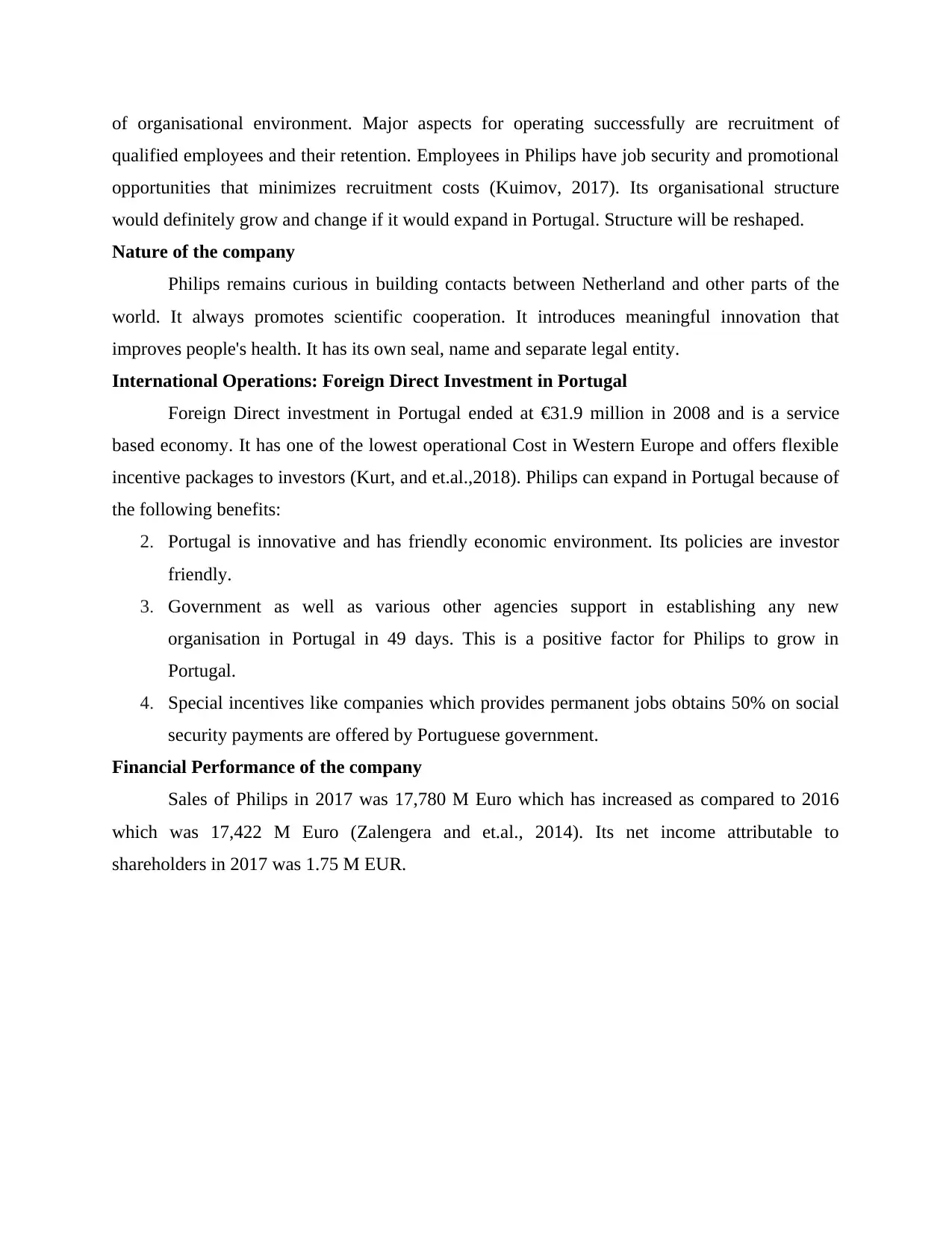
of organisational environment. Major aspects for operating successfully are recruitment of
qualified employees and their retention. Employees in Philips have job security and promotional
opportunities that minimizes recruitment costs (Kuimov, 2017). Its organisational structure
would definitely grow and change if it would expand in Portugal. Structure will be reshaped.
Nature of the company
Philips remains curious in building contacts between Netherland and other parts of the
world. It always promotes scientific cooperation. It introduces meaningful innovation that
improves people's health. It has its own seal, name and separate legal entity.
International Operations: Foreign Direct Investment in Portugal
Foreign Direct investment in Portugal ended at €31.9 million in 2008 and is a service
based economy. It has one of the lowest operational Cost in Western Europe and offers flexible
incentive packages to investors (Kurt, and et.al.,2018). Philips can expand in Portugal because of
the following benefits:
2. Portugal is innovative and has friendly economic environment. Its policies are investor
friendly.
3. Government as well as various other agencies support in establishing any new
organisation in Portugal in 49 days. This is a positive factor for Philips to grow in
Portugal.
4. Special incentives like companies which provides permanent jobs obtains 50% on social
security payments are offered by Portuguese government.
Financial Performance of the company
Sales of Philips in 2017 was 17,780 M Euro which has increased as compared to 2016
which was 17,422 M Euro (Zalengera and et.al., 2014). Its net income attributable to
shareholders in 2017 was 1.75 M EUR.
qualified employees and their retention. Employees in Philips have job security and promotional
opportunities that minimizes recruitment costs (Kuimov, 2017). Its organisational structure
would definitely grow and change if it would expand in Portugal. Structure will be reshaped.
Nature of the company
Philips remains curious in building contacts between Netherland and other parts of the
world. It always promotes scientific cooperation. It introduces meaningful innovation that
improves people's health. It has its own seal, name and separate legal entity.
International Operations: Foreign Direct Investment in Portugal
Foreign Direct investment in Portugal ended at €31.9 million in 2008 and is a service
based economy. It has one of the lowest operational Cost in Western Europe and offers flexible
incentive packages to investors (Kurt, and et.al.,2018). Philips can expand in Portugal because of
the following benefits:
2. Portugal is innovative and has friendly economic environment. Its policies are investor
friendly.
3. Government as well as various other agencies support in establishing any new
organisation in Portugal in 49 days. This is a positive factor for Philips to grow in
Portugal.
4. Special incentives like companies which provides permanent jobs obtains 50% on social
security payments are offered by Portuguese government.
Financial Performance of the company
Sales of Philips in 2017 was 17,780 M Euro which has increased as compared to 2016
which was 17,422 M Euro (Zalengera and et.al., 2014). Its net income attributable to
shareholders in 2017 was 1.75 M EUR.
Paraphrase This Document
Need a fresh take? Get an instant paraphrase of this document with our AI Paraphraser
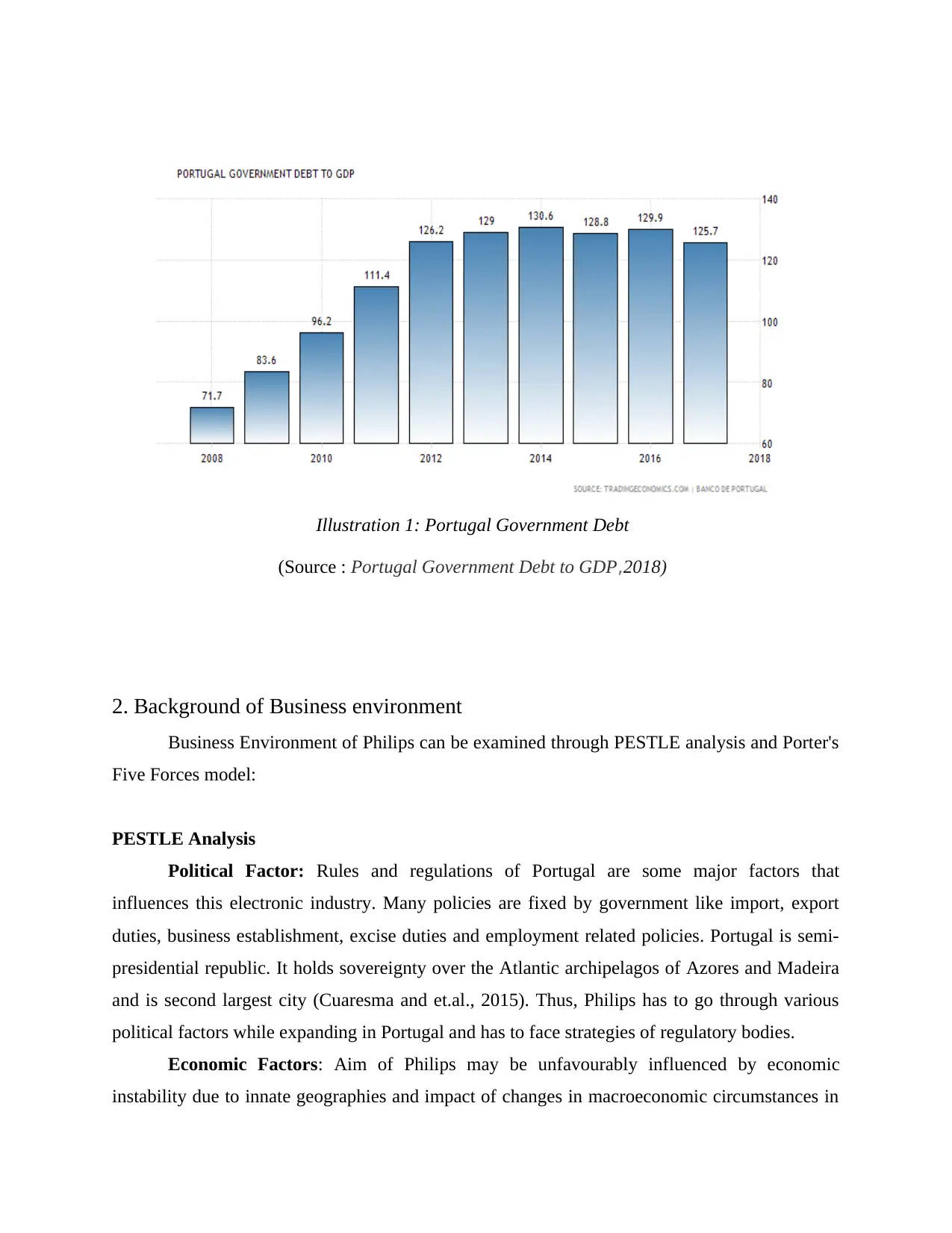
2. Background of Business environment
Business Environment of Philips can be examined through PESTLE analysis and Porter's
Five Forces model:
PESTLE Analysis
Political Factor: Rules and regulations of Portugal are some major factors that
influences this electronic industry. Many policies are fixed by government like import, export
duties, business establishment, excise duties and employment related policies. Portugal is semi-
presidential republic. It holds sovereignty over the Atlantic archipelagos of Azores and Madeira
and is second largest city (Cuaresma and et.al., 2015). Thus, Philips has to go through various
political factors while expanding in Portugal and has to face strategies of regulatory bodies.
Economic Factors: Aim of Philips may be unfavourably influenced by economic
instability due to innate geographies and impact of changes in macroeconomic circumstances in
Illustration 1: Portugal Government Debt
(Source : Portugal Government Debt to GDP,2018)
Business Environment of Philips can be examined through PESTLE analysis and Porter's
Five Forces model:
PESTLE Analysis
Political Factor: Rules and regulations of Portugal are some major factors that
influences this electronic industry. Many policies are fixed by government like import, export
duties, business establishment, excise duties and employment related policies. Portugal is semi-
presidential republic. It holds sovereignty over the Atlantic archipelagos of Azores and Madeira
and is second largest city (Cuaresma and et.al., 2015). Thus, Philips has to go through various
political factors while expanding in Portugal and has to face strategies of regulatory bodies.
Economic Factors: Aim of Philips may be unfavourably influenced by economic
instability due to innate geographies and impact of changes in macroeconomic circumstances in
Illustration 1: Portugal Government Debt
(Source : Portugal Government Debt to GDP,2018)
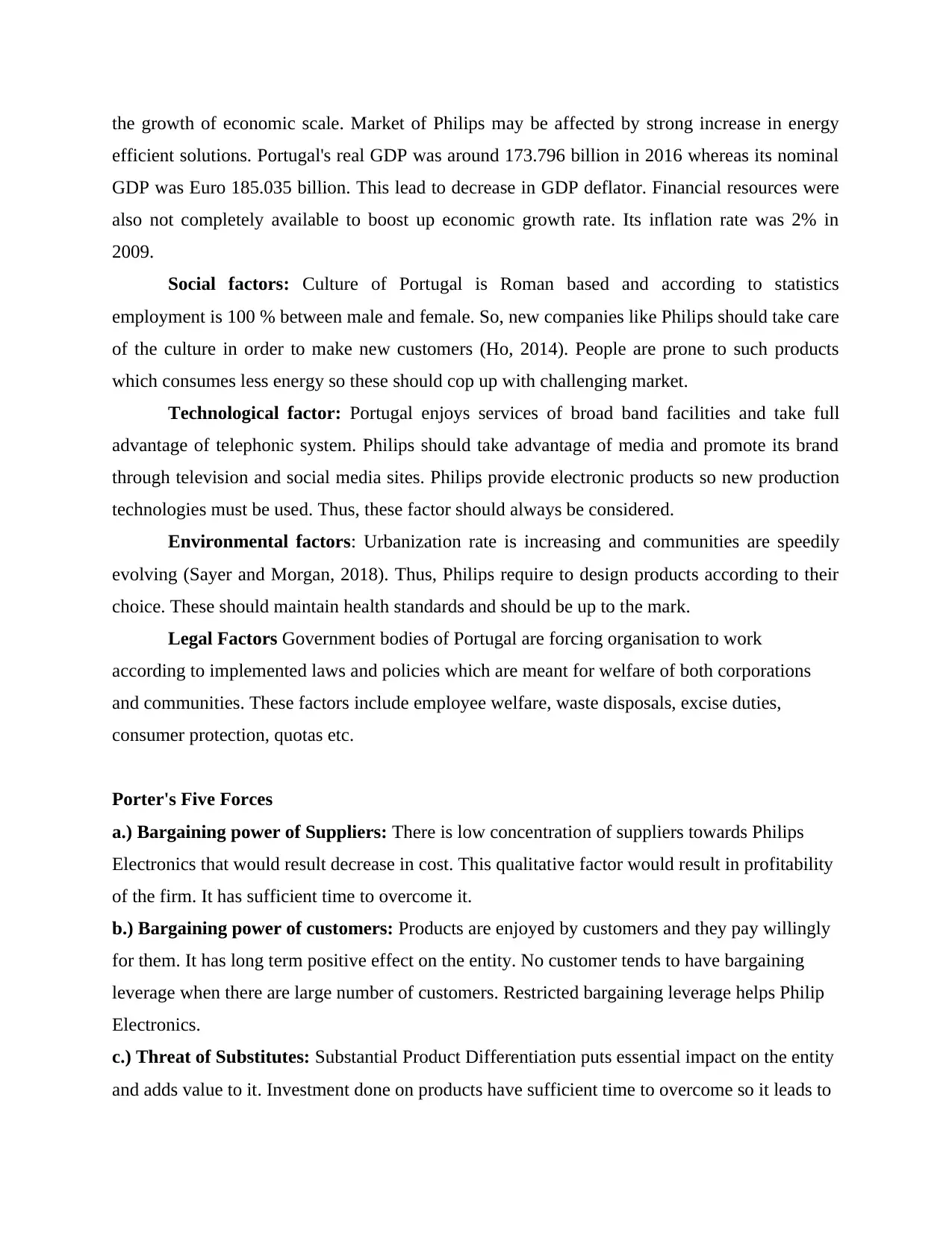
the growth of economic scale. Market of Philips may be affected by strong increase in energy
efficient solutions. Portugal's real GDP was around 173.796 billion in 2016 whereas its nominal
GDP was Euro 185.035 billion. This lead to decrease in GDP deflator. Financial resources were
also not completely available to boost up economic growth rate. Its inflation rate was 2% in
2009.
Social factors: Culture of Portugal is Roman based and according to statistics
employment is 100 % between male and female. So, new companies like Philips should take care
of the culture in order to make new customers (Ho, 2014). People are prone to such products
which consumes less energy so these should cop up with challenging market.
Technological factor: Portugal enjoys services of broad band facilities and take full
advantage of telephonic system. Philips should take advantage of media and promote its brand
through television and social media sites. Philips provide electronic products so new production
technologies must be used. Thus, these factor should always be considered.
Environmental factors: Urbanization rate is increasing and communities are speedily
evolving (Sayer and Morgan, 2018). Thus, Philips require to design products according to their
choice. These should maintain health standards and should be up to the mark.
Legal Factors Government bodies of Portugal are forcing organisation to work
according to implemented laws and policies which are meant for welfare of both corporations
and communities. These factors include employee welfare, waste disposals, excise duties,
consumer protection, quotas etc.
Porter's Five Forces
a.) Bargaining power of Suppliers: There is low concentration of suppliers towards Philips
Electronics that would result decrease in cost. This qualitative factor would result in profitability
of the firm. It has sufficient time to overcome it.
b.) Bargaining power of customers: Products are enjoyed by customers and they pay willingly
for them. It has long term positive effect on the entity. No customer tends to have bargaining
leverage when there are large number of customers. Restricted bargaining leverage helps Philip
Electronics.
c.) Threat of Substitutes: Substantial Product Differentiation puts essential impact on the entity
and adds value to it. Investment done on products have sufficient time to overcome so it leads to
efficient solutions. Portugal's real GDP was around 173.796 billion in 2016 whereas its nominal
GDP was Euro 185.035 billion. This lead to decrease in GDP deflator. Financial resources were
also not completely available to boost up economic growth rate. Its inflation rate was 2% in
2009.
Social factors: Culture of Portugal is Roman based and according to statistics
employment is 100 % between male and female. So, new companies like Philips should take care
of the culture in order to make new customers (Ho, 2014). People are prone to such products
which consumes less energy so these should cop up with challenging market.
Technological factor: Portugal enjoys services of broad band facilities and take full
advantage of telephonic system. Philips should take advantage of media and promote its brand
through television and social media sites. Philips provide electronic products so new production
technologies must be used. Thus, these factor should always be considered.
Environmental factors: Urbanization rate is increasing and communities are speedily
evolving (Sayer and Morgan, 2018). Thus, Philips require to design products according to their
choice. These should maintain health standards and should be up to the mark.
Legal Factors Government bodies of Portugal are forcing organisation to work
according to implemented laws and policies which are meant for welfare of both corporations
and communities. These factors include employee welfare, waste disposals, excise duties,
consumer protection, quotas etc.
Porter's Five Forces
a.) Bargaining power of Suppliers: There is low concentration of suppliers towards Philips
Electronics that would result decrease in cost. This qualitative factor would result in profitability
of the firm. It has sufficient time to overcome it.
b.) Bargaining power of customers: Products are enjoyed by customers and they pay willingly
for them. It has long term positive effect on the entity. No customer tends to have bargaining
leverage when there are large number of customers. Restricted bargaining leverage helps Philip
Electronics.
c.) Threat of Substitutes: Substantial Product Differentiation puts essential impact on the entity
and adds value to it. Investment done on products have sufficient time to overcome so it leads to
⊘ This is a preview!⊘
Do you want full access?
Subscribe today to unlock all pages.

Trusted by 1+ million students worldwide
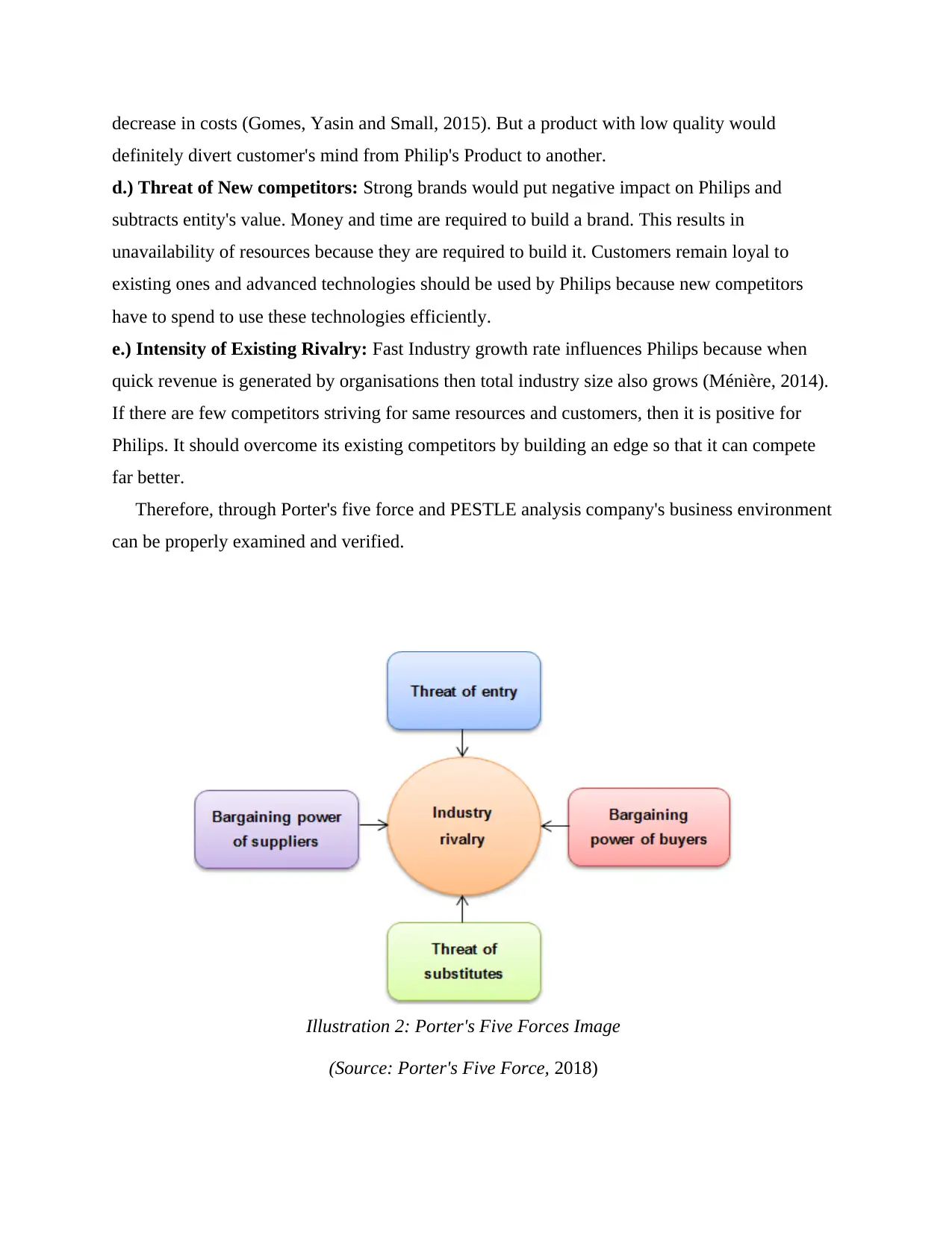
decrease in costs (Gomes, Yasin and Small, 2015). But a product with low quality would
definitely divert customer's mind from Philip's Product to another.
d.) Threat of New competitors: Strong brands would put negative impact on Philips and
subtracts entity's value. Money and time are required to build a brand. This results in
unavailability of resources because they are required to build it. Customers remain loyal to
existing ones and advanced technologies should be used by Philips because new competitors
have to spend to use these technologies efficiently.
e.) Intensity of Existing Rivalry: Fast Industry growth rate influences Philips because when
quick revenue is generated by organisations then total industry size also grows (Ménière, 2014).
If there are few competitors striving for same resources and customers, then it is positive for
Philips. It should overcome its existing competitors by building an edge so that it can compete
far better.
Therefore, through Porter's five force and PESTLE analysis company's business environment
can be properly examined and verified.
Illustration 2: Porter's Five Forces Image
(Source: Porter's Five Force, 2018)
definitely divert customer's mind from Philip's Product to another.
d.) Threat of New competitors: Strong brands would put negative impact on Philips and
subtracts entity's value. Money and time are required to build a brand. This results in
unavailability of resources because they are required to build it. Customers remain loyal to
existing ones and advanced technologies should be used by Philips because new competitors
have to spend to use these technologies efficiently.
e.) Intensity of Existing Rivalry: Fast Industry growth rate influences Philips because when
quick revenue is generated by organisations then total industry size also grows (Ménière, 2014).
If there are few competitors striving for same resources and customers, then it is positive for
Philips. It should overcome its existing competitors by building an edge so that it can compete
far better.
Therefore, through Porter's five force and PESTLE analysis company's business environment
can be properly examined and verified.
Illustration 2: Porter's Five Forces Image
(Source: Porter's Five Force, 2018)
Paraphrase This Document
Need a fresh take? Get an instant paraphrase of this document with our AI Paraphraser
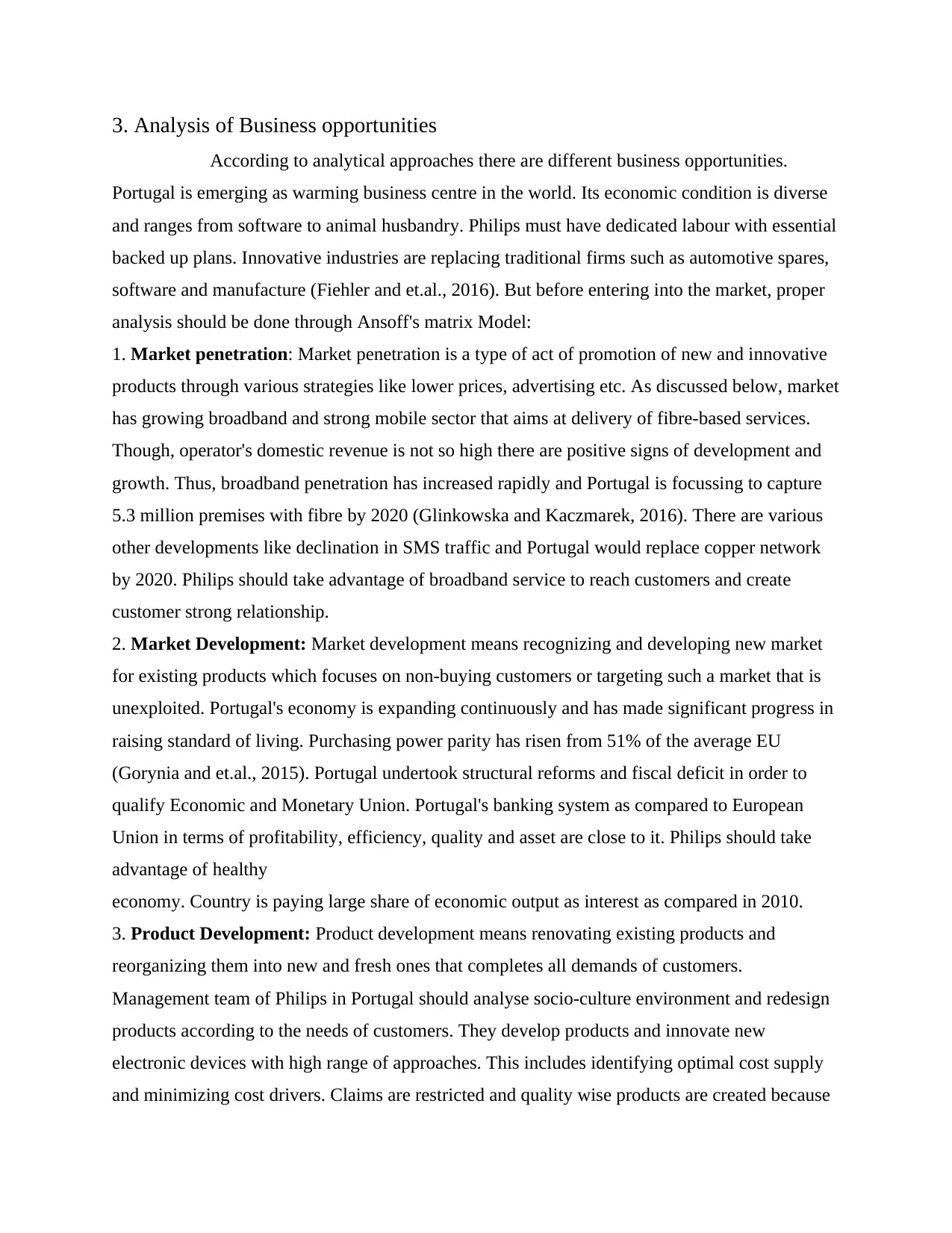
3. Analysis of Business opportunities
According to analytical approaches there are different business opportunities.
Portugal is emerging as warming business centre in the world. Its economic condition is diverse
and ranges from software to animal husbandry. Philips must have dedicated labour with essential
backed up plans. Innovative industries are replacing traditional firms such as automotive spares,
software and manufacture (Fiehler and et.al., 2016). But before entering into the market, proper
analysis should be done through Ansoff's matrix Model:
1. Market penetration: Market penetration is a type of act of promotion of new and innovative
products through various strategies like lower prices, advertising etc. As discussed below, market
has growing broadband and strong mobile sector that aims at delivery of fibre-based services.
Though, operator's domestic revenue is not so high there are positive signs of development and
growth. Thus, broadband penetration has increased rapidly and Portugal is focussing to capture
5.3 million premises with fibre by 2020 (Glinkowska and Kaczmarek, 2016). There are various
other developments like declination in SMS traffic and Portugal would replace copper network
by 2020. Philips should take advantage of broadband service to reach customers and create
customer strong relationship.
2. Market Development: Market development means recognizing and developing new market
for existing products which focuses on non-buying customers or targeting such a market that is
unexploited. Portugal's economy is expanding continuously and has made significant progress in
raising standard of living. Purchasing power parity has risen from 51% of the average EU
(Gorynia and et.al., 2015). Portugal undertook structural reforms and fiscal deficit in order to
qualify Economic and Monetary Union. Portugal's banking system as compared to European
Union in terms of profitability, efficiency, quality and asset are close to it. Philips should take
advantage of healthy
economy. Country is paying large share of economic output as interest as compared in 2010.
3. Product Development: Product development means renovating existing products and
reorganizing them into new and fresh ones that completes all demands of customers.
Management team of Philips in Portugal should analyse socio-culture environment and redesign
products according to the needs of customers. They develop products and innovate new
electronic devices with high range of approaches. This includes identifying optimal cost supply
and minimizing cost drivers. Claims are restricted and quality wise products are created because
According to analytical approaches there are different business opportunities.
Portugal is emerging as warming business centre in the world. Its economic condition is diverse
and ranges from software to animal husbandry. Philips must have dedicated labour with essential
backed up plans. Innovative industries are replacing traditional firms such as automotive spares,
software and manufacture (Fiehler and et.al., 2016). But before entering into the market, proper
analysis should be done through Ansoff's matrix Model:
1. Market penetration: Market penetration is a type of act of promotion of new and innovative
products through various strategies like lower prices, advertising etc. As discussed below, market
has growing broadband and strong mobile sector that aims at delivery of fibre-based services.
Though, operator's domestic revenue is not so high there are positive signs of development and
growth. Thus, broadband penetration has increased rapidly and Portugal is focussing to capture
5.3 million premises with fibre by 2020 (Glinkowska and Kaczmarek, 2016). There are various
other developments like declination in SMS traffic and Portugal would replace copper network
by 2020. Philips should take advantage of broadband service to reach customers and create
customer strong relationship.
2. Market Development: Market development means recognizing and developing new market
for existing products which focuses on non-buying customers or targeting such a market that is
unexploited. Portugal's economy is expanding continuously and has made significant progress in
raising standard of living. Purchasing power parity has risen from 51% of the average EU
(Gorynia and et.al., 2015). Portugal undertook structural reforms and fiscal deficit in order to
qualify Economic and Monetary Union. Portugal's banking system as compared to European
Union in terms of profitability, efficiency, quality and asset are close to it. Philips should take
advantage of healthy
economy. Country is paying large share of economic output as interest as compared in 2010.
3. Product Development: Product development means renovating existing products and
reorganizing them into new and fresh ones that completes all demands of customers.
Management team of Philips in Portugal should analyse socio-culture environment and redesign
products according to the needs of customers. They develop products and innovate new
electronic devices with high range of approaches. This includes identifying optimal cost supply
and minimizing cost drivers. Claims are restricted and quality wise products are created because
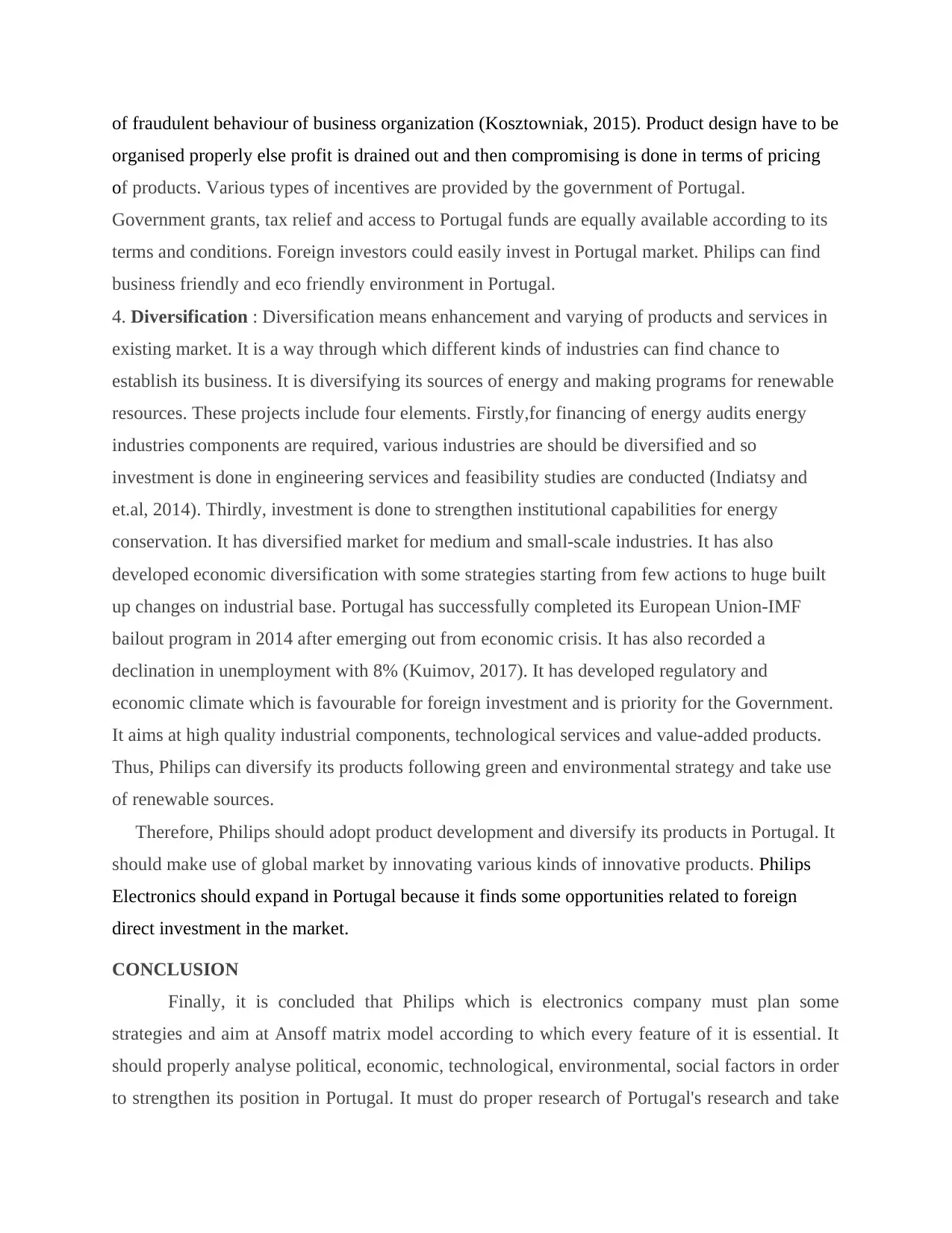
of fraudulent behaviour of business organization (Kosztowniak, 2015). Product design have to be
organised properly else profit is drained out and then compromising is done in terms of pricing
of products. Various types of incentives are provided by the government of Portugal.
Government grants, tax relief and access to Portugal funds are equally available according to its
terms and conditions. Foreign investors could easily invest in Portugal market. Philips can find
business friendly and eco friendly environment in Portugal.
4. Diversification : Diversification means enhancement and varying of products and services in
existing market. It is a way through which different kinds of industries can find chance to
establish its business. It is diversifying its sources of energy and making programs for renewable
resources. These projects include four elements. Firstly,for financing of energy audits energy
industries components are required, various industries are should be diversified and so
investment is done in engineering services and feasibility studies are conducted (Indiatsy and
et.al, 2014). Thirdly, investment is done to strengthen institutional capabilities for energy
conservation. It has diversified market for medium and small-scale industries. It has also
developed economic diversification with some strategies starting from few actions to huge built
up changes on industrial base. Portugal has successfully completed its European Union-IMF
bailout program in 2014 after emerging out from economic crisis. It has also recorded a
declination in unemployment with 8% (Kuimov, 2017). It has developed regulatory and
economic climate which is favourable for foreign investment and is priority for the Government.
It aims at high quality industrial components, technological services and value-added products.
Thus, Philips can diversify its products following green and environmental strategy and take use
of renewable sources.
Therefore, Philips should adopt product development and diversify its products in Portugal. It
should make use of global market by innovating various kinds of innovative products. Philips
Electronics should expand in Portugal because it finds some opportunities related to foreign
direct investment in the market.
CONCLUSION
Finally, it is concluded that Philips which is electronics company must plan some
strategies and aim at Ansoff matrix model according to which every feature of it is essential. It
should properly analyse political, economic, technological, environmental, social factors in order
to strengthen its position in Portugal. It must do proper research of Portugal's research and take
organised properly else profit is drained out and then compromising is done in terms of pricing
of products. Various types of incentives are provided by the government of Portugal.
Government grants, tax relief and access to Portugal funds are equally available according to its
terms and conditions. Foreign investors could easily invest in Portugal market. Philips can find
business friendly and eco friendly environment in Portugal.
4. Diversification : Diversification means enhancement and varying of products and services in
existing market. It is a way through which different kinds of industries can find chance to
establish its business. It is diversifying its sources of energy and making programs for renewable
resources. These projects include four elements. Firstly,for financing of energy audits energy
industries components are required, various industries are should be diversified and so
investment is done in engineering services and feasibility studies are conducted (Indiatsy and
et.al, 2014). Thirdly, investment is done to strengthen institutional capabilities for energy
conservation. It has diversified market for medium and small-scale industries. It has also
developed economic diversification with some strategies starting from few actions to huge built
up changes on industrial base. Portugal has successfully completed its European Union-IMF
bailout program in 2014 after emerging out from economic crisis. It has also recorded a
declination in unemployment with 8% (Kuimov, 2017). It has developed regulatory and
economic climate which is favourable for foreign investment and is priority for the Government.
It aims at high quality industrial components, technological services and value-added products.
Thus, Philips can diversify its products following green and environmental strategy and take use
of renewable sources.
Therefore, Philips should adopt product development and diversify its products in Portugal. It
should make use of global market by innovating various kinds of innovative products. Philips
Electronics should expand in Portugal because it finds some opportunities related to foreign
direct investment in the market.
CONCLUSION
Finally, it is concluded that Philips which is electronics company must plan some
strategies and aim at Ansoff matrix model according to which every feature of it is essential. It
should properly analyse political, economic, technological, environmental, social factors in order
to strengthen its position in Portugal. It must do proper research of Portugal's research and take
⊘ This is a preview!⊘
Do you want full access?
Subscribe today to unlock all pages.

Trusted by 1+ million students worldwide
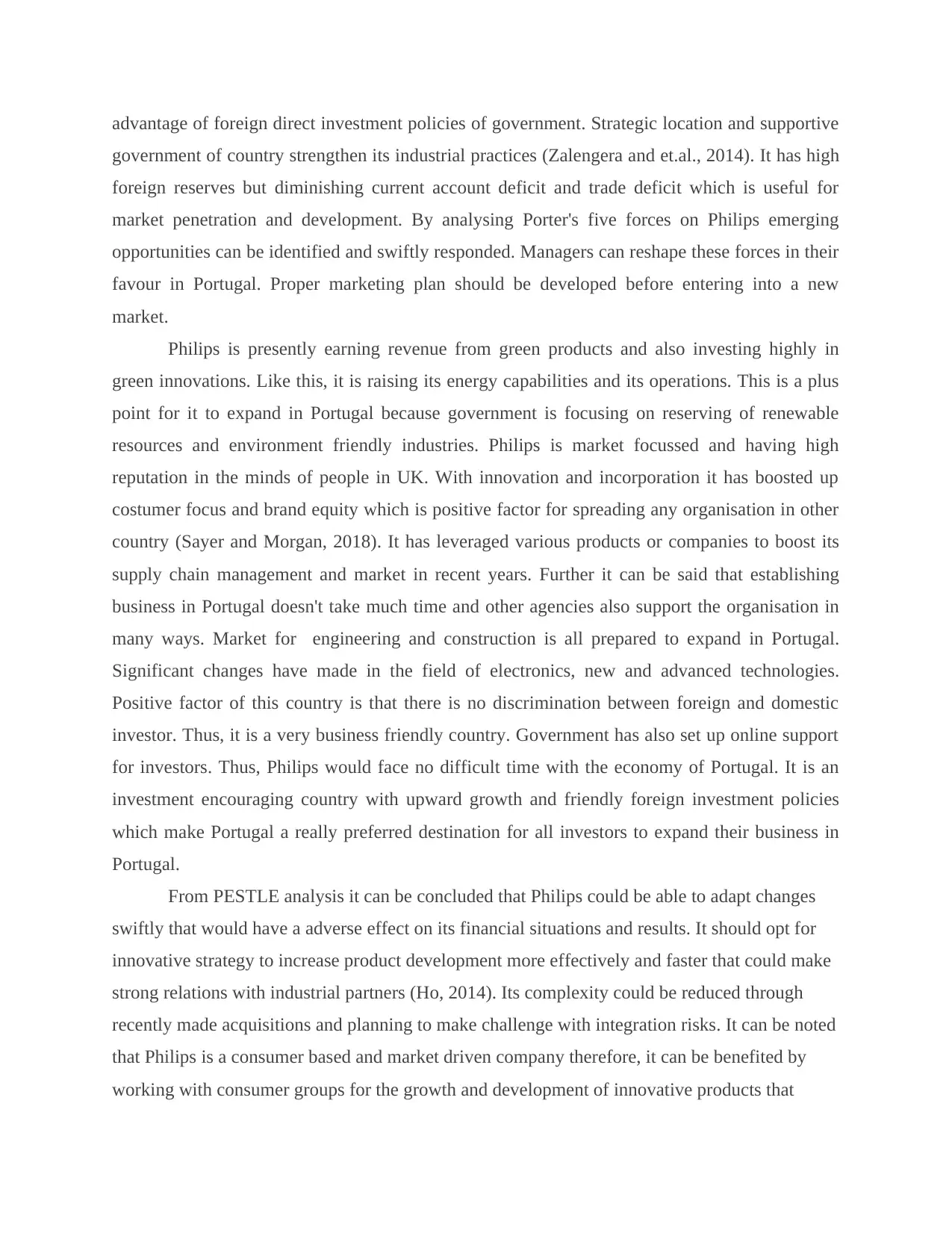
advantage of foreign direct investment policies of government. Strategic location and supportive
government of country strengthen its industrial practices (Zalengera and et.al., 2014). It has high
foreign reserves but diminishing current account deficit and trade deficit which is useful for
market penetration and development. By analysing Porter's five forces on Philips emerging
opportunities can be identified and swiftly responded. Managers can reshape these forces in their
favour in Portugal. Proper marketing plan should be developed before entering into a new
market.
Philips is presently earning revenue from green products and also investing highly in
green innovations. Like this, it is raising its energy capabilities and its operations. This is a plus
point for it to expand in Portugal because government is focusing on reserving of renewable
resources and environment friendly industries. Philips is market focussed and having high
reputation in the minds of people in UK. With innovation and incorporation it has boosted up
costumer focus and brand equity which is positive factor for spreading any organisation in other
country (Sayer and Morgan, 2018). It has leveraged various products or companies to boost its
supply chain management and market in recent years. Further it can be said that establishing
business in Portugal doesn't take much time and other agencies also support the organisation in
many ways. Market for engineering and construction is all prepared to expand in Portugal.
Significant changes have made in the field of electronics, new and advanced technologies.
Positive factor of this country is that there is no discrimination between foreign and domestic
investor. Thus, it is a very business friendly country. Government has also set up online support
for investors. Thus, Philips would face no difficult time with the economy of Portugal. It is an
investment encouraging country with upward growth and friendly foreign investment policies
which make Portugal a really preferred destination for all investors to expand their business in
Portugal.
From PESTLE analysis it can be concluded that Philips could be able to adapt changes
swiftly that would have a adverse effect on its financial situations and results. It should opt for
innovative strategy to increase product development more effectively and faster that could make
strong relations with industrial partners (Ho, 2014). Its complexity could be reduced through
recently made acquisitions and planning to make challenge with integration risks. It can be noted
that Philips is a consumer based and market driven company therefore, it can be benefited by
working with consumer groups for the growth and development of innovative products that
government of country strengthen its industrial practices (Zalengera and et.al., 2014). It has high
foreign reserves but diminishing current account deficit and trade deficit which is useful for
market penetration and development. By analysing Porter's five forces on Philips emerging
opportunities can be identified and swiftly responded. Managers can reshape these forces in their
favour in Portugal. Proper marketing plan should be developed before entering into a new
market.
Philips is presently earning revenue from green products and also investing highly in
green innovations. Like this, it is raising its energy capabilities and its operations. This is a plus
point for it to expand in Portugal because government is focusing on reserving of renewable
resources and environment friendly industries. Philips is market focussed and having high
reputation in the minds of people in UK. With innovation and incorporation it has boosted up
costumer focus and brand equity which is positive factor for spreading any organisation in other
country (Sayer and Morgan, 2018). It has leveraged various products or companies to boost its
supply chain management and market in recent years. Further it can be said that establishing
business in Portugal doesn't take much time and other agencies also support the organisation in
many ways. Market for engineering and construction is all prepared to expand in Portugal.
Significant changes have made in the field of electronics, new and advanced technologies.
Positive factor of this country is that there is no discrimination between foreign and domestic
investor. Thus, it is a very business friendly country. Government has also set up online support
for investors. Thus, Philips would face no difficult time with the economy of Portugal. It is an
investment encouraging country with upward growth and friendly foreign investment policies
which make Portugal a really preferred destination for all investors to expand their business in
Portugal.
From PESTLE analysis it can be concluded that Philips could be able to adapt changes
swiftly that would have a adverse effect on its financial situations and results. It should opt for
innovative strategy to increase product development more effectively and faster that could make
strong relations with industrial partners (Ho, 2014). Its complexity could be reduced through
recently made acquisitions and planning to make challenge with integration risks. It can be noted
that Philips is a consumer based and market driven company therefore, it can be benefited by
working with consumer groups for the growth and development of innovative products that
Paraphrase This Document
Need a fresh take? Get an instant paraphrase of this document with our AI Paraphraser
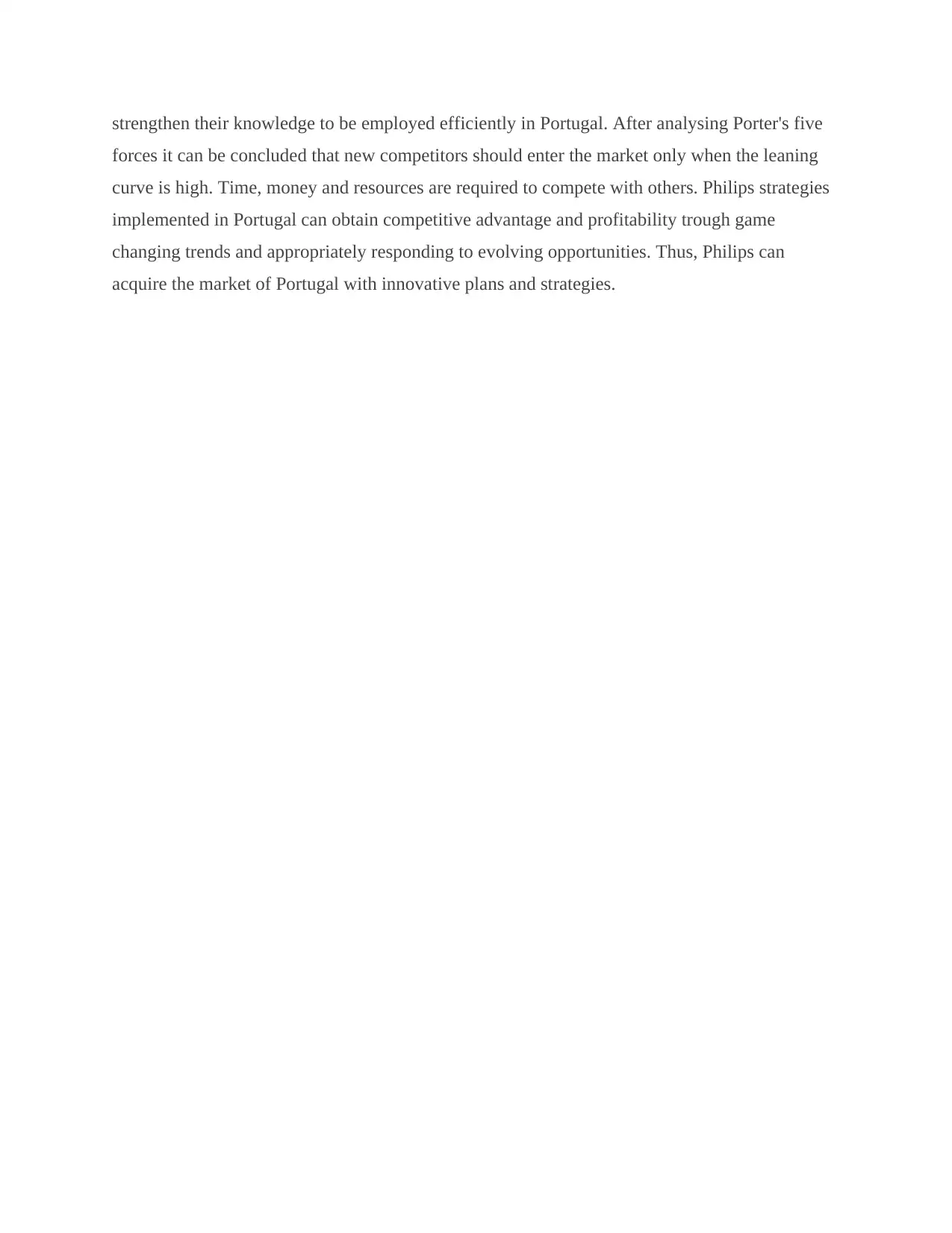
strengthen their knowledge to be employed efficiently in Portugal. After analysing Porter's five
forces it can be concluded that new competitors should enter the market only when the leaning
curve is high. Time, money and resources are required to compete with others. Philips strategies
implemented in Portugal can obtain competitive advantage and profitability trough game
changing trends and appropriately responding to evolving opportunities. Thus, Philips can
acquire the market of Portugal with innovative plans and strategies.
forces it can be concluded that new competitors should enter the market only when the leaning
curve is high. Time, money and resources are required to compete with others. Philips strategies
implemented in Portugal can obtain competitive advantage and profitability trough game
changing trends and appropriately responding to evolving opportunities. Thus, Philips can
acquire the market of Portugal with innovative plans and strategies.
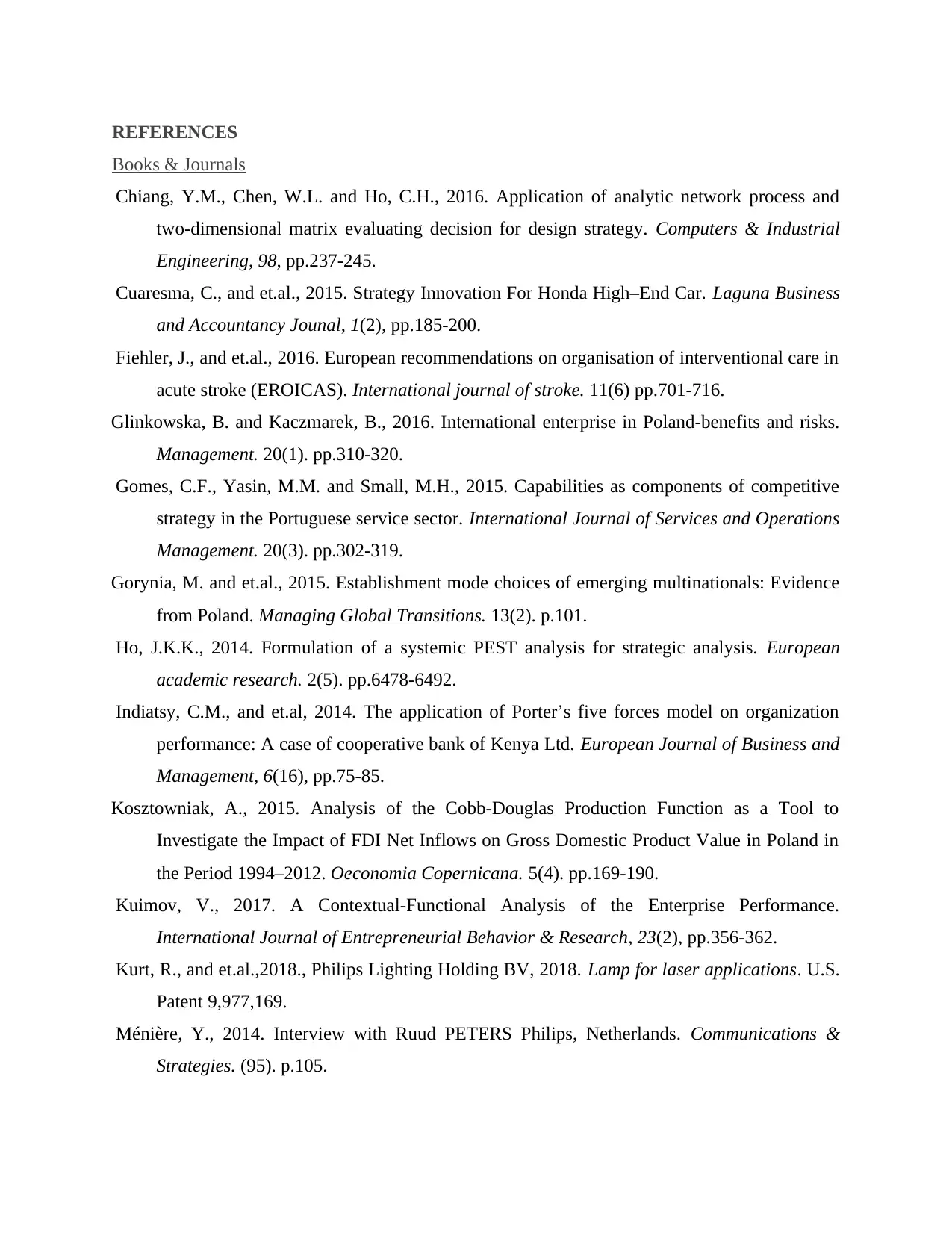
REFERENCES
Books & Journals
Chiang, Y.M., Chen, W.L. and Ho, C.H., 2016. Application of analytic network process and
two-dimensional matrix evaluating decision for design strategy. Computers & Industrial
Engineering, 98, pp.237-245.
Cuaresma, C., and et.al., 2015. Strategy Innovation For Honda High–End Car. Laguna Business
and Accountancy Jounal, 1(2), pp.185-200.
Fiehler, J., and et.al., 2016. European recommendations on organisation of interventional care in
acute stroke (EROICAS). International journal of stroke. 11(6) pp.701-716.
Glinkowska, B. and Kaczmarek, B., 2016. International enterprise in Poland-benefits and risks.
Management. 20(1). pp.310-320.
Gomes, C.F., Yasin, M.M. and Small, M.H., 2015. Capabilities as components of competitive
strategy in the Portuguese service sector. International Journal of Services and Operations
Management. 20(3). pp.302-319.
Gorynia, M. and et.al., 2015. Establishment mode choices of emerging multinationals: Evidence
from Poland. Managing Global Transitions. 13(2). p.101.
Ho, J.K.K., 2014. Formulation of a systemic PEST analysis for strategic analysis. European
academic research. 2(5). pp.6478-6492.
Indiatsy, C.M., and et.al, 2014. The application of Porter’s five forces model on organization
performance: A case of cooperative bank of Kenya Ltd. European Journal of Business and
Management, 6(16), pp.75-85.
Kosztowniak, A., 2015. Analysis of the Cobb-Douglas Production Function as a Tool to
Investigate the Impact of FDI Net Inflows on Gross Domestic Product Value in Poland in
the Period 1994–2012. Oeconomia Copernicana. 5(4). pp.169-190.
Kuimov, V., 2017. A Contextual-Functional Analysis of the Enterprise Performance.
International Journal of Entrepreneurial Behavior & Research, 23(2), pp.356-362.
Kurt, R., and et.al.,2018., Philips Lighting Holding BV, 2018. Lamp for laser applications. U.S.
Patent 9,977,169.
Ménière, Y., 2014. Interview with Ruud PETERS Philips, Netherlands. Communications &
Strategies. (95). p.105.
Books & Journals
Chiang, Y.M., Chen, W.L. and Ho, C.H., 2016. Application of analytic network process and
two-dimensional matrix evaluating decision for design strategy. Computers & Industrial
Engineering, 98, pp.237-245.
Cuaresma, C., and et.al., 2015. Strategy Innovation For Honda High–End Car. Laguna Business
and Accountancy Jounal, 1(2), pp.185-200.
Fiehler, J., and et.al., 2016. European recommendations on organisation of interventional care in
acute stroke (EROICAS). International journal of stroke. 11(6) pp.701-716.
Glinkowska, B. and Kaczmarek, B., 2016. International enterprise in Poland-benefits and risks.
Management. 20(1). pp.310-320.
Gomes, C.F., Yasin, M.M. and Small, M.H., 2015. Capabilities as components of competitive
strategy in the Portuguese service sector. International Journal of Services and Operations
Management. 20(3). pp.302-319.
Gorynia, M. and et.al., 2015. Establishment mode choices of emerging multinationals: Evidence
from Poland. Managing Global Transitions. 13(2). p.101.
Ho, J.K.K., 2014. Formulation of a systemic PEST analysis for strategic analysis. European
academic research. 2(5). pp.6478-6492.
Indiatsy, C.M., and et.al, 2014. The application of Porter’s five forces model on organization
performance: A case of cooperative bank of Kenya Ltd. European Journal of Business and
Management, 6(16), pp.75-85.
Kosztowniak, A., 2015. Analysis of the Cobb-Douglas Production Function as a Tool to
Investigate the Impact of FDI Net Inflows on Gross Domestic Product Value in Poland in
the Period 1994–2012. Oeconomia Copernicana. 5(4). pp.169-190.
Kuimov, V., 2017. A Contextual-Functional Analysis of the Enterprise Performance.
International Journal of Entrepreneurial Behavior & Research, 23(2), pp.356-362.
Kurt, R., and et.al.,2018., Philips Lighting Holding BV, 2018. Lamp for laser applications. U.S.
Patent 9,977,169.
Ménière, Y., 2014. Interview with Ruud PETERS Philips, Netherlands. Communications &
Strategies. (95). p.105.
⊘ This is a preview!⊘
Do you want full access?
Subscribe today to unlock all pages.

Trusted by 1+ million students worldwide
1 out of 13
Related Documents
Your All-in-One AI-Powered Toolkit for Academic Success.
+13062052269
info@desklib.com
Available 24*7 on WhatsApp / Email
![[object Object]](/_next/static/media/star-bottom.7253800d.svg)
Unlock your academic potential
Copyright © 2020–2025 A2Z Services. All Rights Reserved. Developed and managed by ZUCOL.


